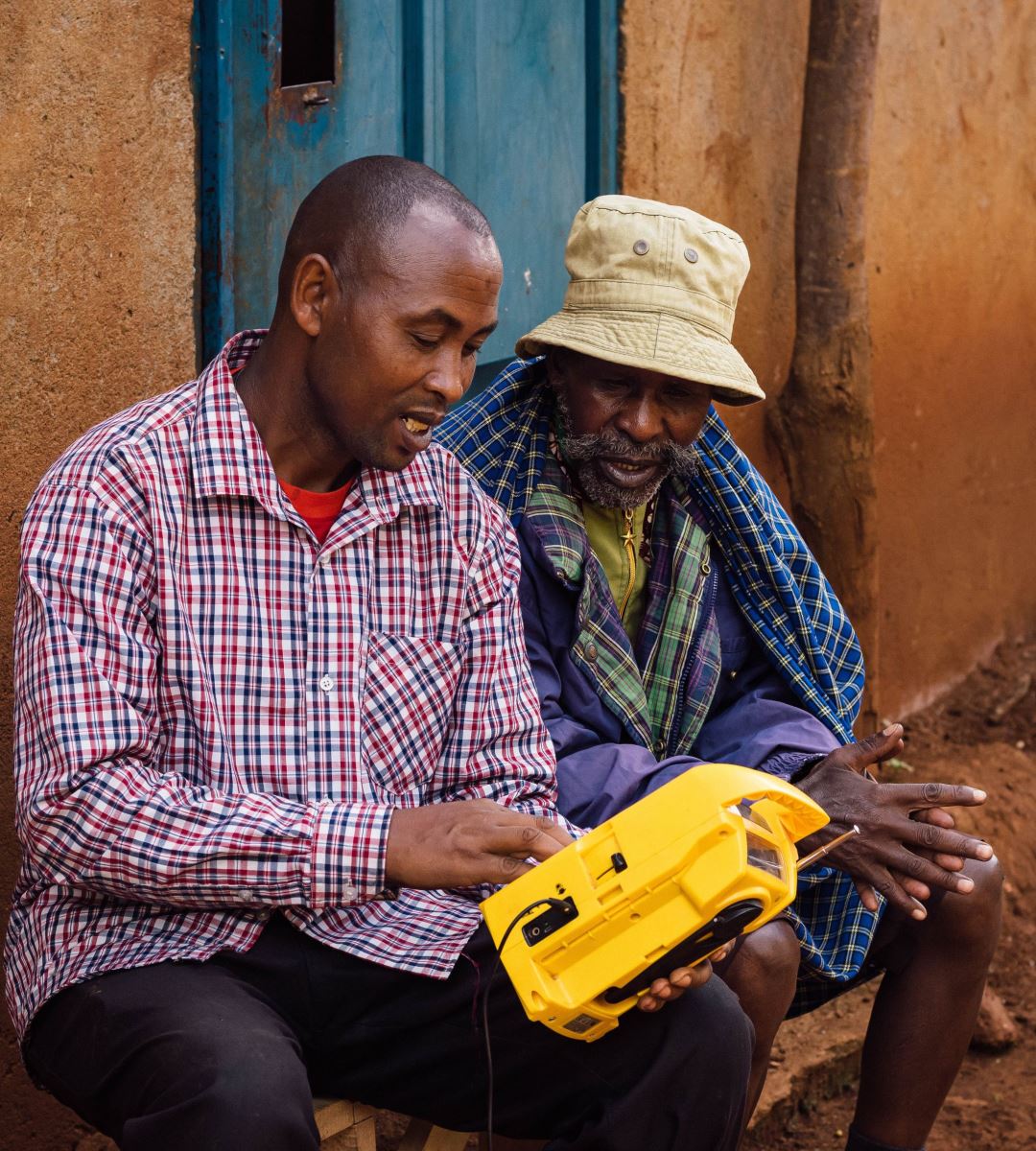Background: How Tanzanian farmers benefit from radio programmes

Florian Gitu Kwaslema (left) and his father (right) listen to radio programmes for farmers using a solar battery-powered device provided by Farm Radio. The radio programmes offer lessons and advice on sustainable organic farming.
Tanzanian farmer Florian Gitu Kwaslema now listens to the radio regularly. He is so enthusiastic about programmes on organic farming and agroecology that he has converted his farm. This is also a success for the Liechtenstein Development Service (LED), which is supporting this radio project together with other international organisations.
Farmer Florian Gitu Kwaslema lives with his wife and their four children in a village in the north of Tanzania, a few hours' drive from the nearest larger town. Until a few years ago, he cultivated his fields in the conventional way: he bought expensive seeds from agricultural companies, used synthetic chemical pesticides and artificial fertilisers and thought this was the only right way to farm at the time.
Until he listened to a radio programme about sustainable agriculture on Farm Radio International (FRI) for the first time three years ago. Fascinated by this concept, he quickly changed his method. He then joined a group of farmers and began listening to the programmes regularly. He gradually learnt to manage his farm using sustainable and organic methods of agroecology. FRI provided his group with a solar-powered GPS radio with a recording function so that the members could listen to the programmes if they didn't have the time. They submitted questions via SMS and received feedback in the next programme: an efficient learning method.
The effort paid off
Florian Gitu Kwaslema invested time, money and effort - and is now harvesting success. He set a good example and now inspires others. He discusses the content of the programmes with like-minded people in his group and tests out what he has learned. Today, he harvests seeds from his own fields and uses the manure from his own cows as fertiliser. He fights pests with organic products. His income has increased and he can invest some of it in his house. He is a sought-after expert in his neighbourhood - neighbouring farmers who have witnessed the change come and ask him for advice on how to make the switch.
More about this LED project
The LED has been supporting this project in Tanzania since the beginning of 2024. Together with its international partners Biovision and Farm Radio International, the LED has helped to ensure that over 80% of radio listeners have already heard about agroecological methods. Five radio stations with a potential listening reach of around 5 million are currently involved in this project. By 2027, a further ten stations are to be added and the number of people sensitised to agroecological methods is to double from around two million today to at least four million - and at least 1.2 million of them are to apply these agroecological practices, just as farmer Florian Gitu Kwaslema is already doing today. Another goal is to establish a self-sustaining business model for radio programmes on agroecology.
Picture captions:
Picture 1: Florian Gitu Kwaslema (left) and his father (right) listen to radio programmes for farmers using a solar battery-powered device provided by Farm Radio. The radio programmes offer lessons and advice on sustainable organic farming. With the device, Florian can record the programmes and later share them with other farmers. (All pictures: Amini Suwedi, with friendly permission of Biovision)
More pictures on request:
Image 2: Thanks in part to radio professionals like Lydia Kishia and the interactive programmes, millions of people in Tanzania have now been sensitised to agroecological methods.
Image 3: Thanks to the programmes, farmer Florian Gitu Kwaslema receives techniques and advice specifically for organic farming and livestock breeding. He has now successfully converted his farm to organic farming and agroecological cultivation methods.
Contact for the media: A. Ospelt, alexandra.ospelt@led.li, (T) +423 222 09 79 or (M) 782 09 79
